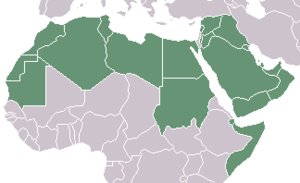 Image via Wikipedia
Image via WikipediaNow the unrest has reached Libya
Gaddafi, the maverick and unchallenged dictator, had maintained a "divide and rule" policy during the years of his rule in order to ensure his rule until his last breath. He had never honed a successor. His country became prosperous (or rather Gaddafi and his family) while the oil wealth never reached the Libyan people, who like in most oil-rich Arab countries, remained in abject poverty.
While sweeping changes are occurring all over the Arab world, starting with Tunisia as a result of a poor vegetable vendor and spread like wild fire over the Arab world. Libya Libya has a high literacy rate (For the total population of Libya Libya Libya has the highest literacy rate in northern Africa ) contrary to what one may expect. Education is readily available but the Libyan people have no political or human rights.
Gaddafi's power is under threat and from what we see now his power base is weakening. Many parts of Libya
Gaddafi's cruelty knows no bounds. His army and police force have defected to the rebels. Libyan diplomats all over the world are resigning. They refuse to represent the Gaddafi regime. Most have changed allegiance to the opposition. Gaddafi has taken on mercenaries to kill his people. The sight of bound bodies in the streets, shot at point blank range are gruesome.
The UN and the US US is dithering again as it did in Egypt Iraq , Afghanistan and even further back in time - Vietnam US
Meanwhile, Gaddafi is still holding on to Tripoli while Benghazi
Despite the "divide and rule" policy of the Gaddafi regime, the large number of tribes in Libya
The speeches that Gaddafi made were incoherent, lacking in logic and cast great doubts on his sanity. There is nothing worse for any country than having a tyrant who is insane and massacres his people. Gaddafi is a desperate, tyrannical lunatic. He knows that the end of his rule is near. It would be no surprise if he commits suicide when he loses his grip on power.
The situation in Libya
Every Arab state that has been swept up by the uprisings, despite their differences, has much in common. It is the desire for change from the old order of corrupt autocrats. They are fighting for the same goals of freedom, democracy, human rights and employment. The mantra that the West was led to believe by the autocratic dictatorships, that democracy is not suited to Islam and the Arab world is falling apart. All the Arab world uprisings have their sources of information from the youth using Face book and Twitter. (I wonder what Mark Zukerburg, the inventor of Face book, is feeling now. His software programme has changed the Arab world by sparking off revolutions.)
As an Israeli, I think we have a wonderful opportunity to make peace with our Arab neighbours. The opportunity may or may not be fraught with dangers of the unknown. There is room for cautious optimism. The youth are discarding the mantras of their aging autocratic dictatorships. Surely the time has come for us to do the same towards a changing Arab world. Even in Libya
Perhaps it is to Israel 's advantage that apart from with Egypt and Jordan , Israel Israel has an opportunity to make peace with the Arab people and not corrupt tyrannical regimes as in Egypt and maybe even Jordan
However, Israel
As I mentioned in my previous article, there are steps that Israel Israel Israel Israel
When the Israeli electorate realizes that it is in Israel's interest to rid their country of this right wing, visionless, racist government at the ballot box, can we take our rightful place amongst the world of nations with pride rather than being a polecat as we are at present.












